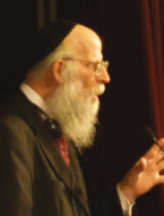Two Tears in the Ocean: Testimonies of Suffering and the Miraculous
October 22, 2014
 Next Tuesday, October 28, at 4 p.m. in the Bush Conference Center, Beckman Hall, room 404, scholar and author Dr. Alan Rosen will speak on a challenging and complex topic. His lecture is entitled “Miraculous Testimony: Recounting Wondrous Interventions from the Days of Wrath.” As Dr. Rosen would be the first to say, the miraculous would seem on the face of it to have little place in Holocaust testimony or in the Holocaust in general. Indeed, reference to the miraculous might appear to go against the uniquely horrific nature of the Holocaust. Yet, as Dr. Rosen affirms, for some witnesses, recounting their experiences of the miraculous is as important as speaking of their suffering and loss. Their testimony to the miraculous must be heard, even if we find the idea a particularly challenging one. By doing so, Dr. Rosen suggests, we gain a more nuanced understanding of what victims of the Holocaust experienced and why some survivors felt and feel yet today a deep spiritual obligation to testify.
Next Tuesday, October 28, at 4 p.m. in the Bush Conference Center, Beckman Hall, room 404, scholar and author Dr. Alan Rosen will speak on a challenging and complex topic. His lecture is entitled “Miraculous Testimony: Recounting Wondrous Interventions from the Days of Wrath.” As Dr. Rosen would be the first to say, the miraculous would seem on the face of it to have little place in Holocaust testimony or in the Holocaust in general. Indeed, reference to the miraculous might appear to go against the uniquely horrific nature of the Holocaust. Yet, as Dr. Rosen affirms, for some witnesses, recounting their experiences of the miraculous is as important as speaking of their suffering and loss. Their testimony to the miraculous must be heard, even if we find the idea a particularly challenging one. By doing so, Dr. Rosen suggests, we gain a more nuanced understanding of what victims of the Holocaust experienced and why some survivors felt and feel yet today a deep spiritual obligation to testify.
In his memoir All Rivers Run to the Sea, Elie Wiesel speaks to the unfathomable mystery at the core of the Holocaust: “The barbed-wire kingdom will forever remain an immense question mark on the scale of both humanity and its Creator” (p. 105). It was a question mark formed by silence and absence, both divine and human.
And there are questions marks of silence and absence yet today. They frame the photographs we see on the news of children and adults by the thousands dying abandoned in Liberia and Sierra Leone, the health systems of those countries overwhelmed by the massive need. Once again both God and humankind stand questioned.
In Night, Wiesel writes of the incomprehensible silence of God and humankind. That silence has become all too familiar to us. We are less familiar with the miraculous moments of divine presence, sometimes conveyed through an act of unexpected human kindness. Such moments did not erase the questions or fill the silence; in fact, those moments may have made silence and absence even harder to bear. At the end of his commentary, Wiesel recounts a Midrash about God’s response to human suffering. He writes, “God sheds two tears in the ocean. When they fall, they make a noise so loud it is heard round the world.” (p. 105)
Each day courageous doctors and nurses make their way toward, not away from, the suffering in Liberia and Sierra Leone, daring to put their own lives at risk in order to help those in desperate need. They seem so overmatched by the number of ill that they may wonder what difference they can possibly make, and yet, they go anyway, knowing that to do something is better than to do nothing.
I can’t help but think they have heard two tears fall in the ocean. Now it is a question of what we will hear–and what we will do.
Join us October 28 at 4 p.m. in the Bush Conference Center (Beckman Hall, room 404).
Admission is free. No reservations required. Read more about Dr. Rosen’s presentation »
